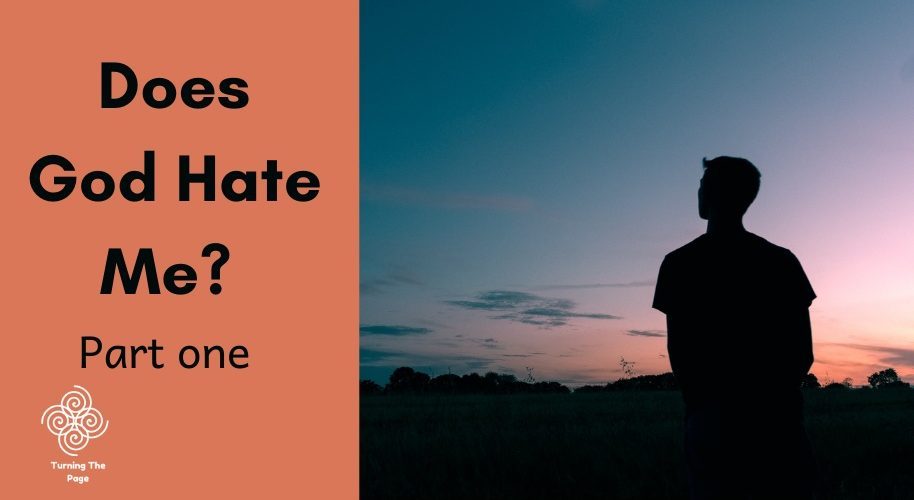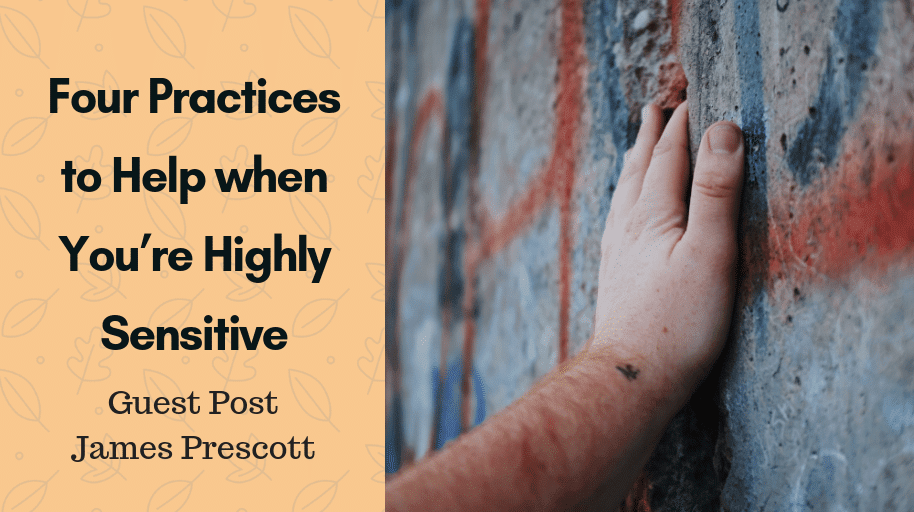Does God Hate me? Is God punishing me? Questions like these need gentle and grace-filled responses, so here are twelve questions that I would like to ask and explore.
Sometimes, when I listen to people, I hear little comments that bring a sense of sadness to my heart. Some firmly held beliefs that over time and repeated often enough create in them mental unwellness.
Phrases such as
‘God is punishing me.’
‘God is angry with me.’
‘God hates me.’
I don’t think I have ever felt that God hates me, but I have wondered, particularly as a child, that my illnesses or problems might be the consequence of something I’ve done. That God is punishing me.
‘You did this, and so here is the punishment or consequence.’
‘Start doing the right things, and then God might be inclined to help you.’
Seems logical.
Isn’t that what typically happens? You do something wrong, and there is a consequence.
We can so easily create a conclusion by how we add up the facts or what we perceive as the facts.
Those conclusions become belief systems through which everything passes. They can become so deeply entrenched that everything flows into them. The brain then wires itself to look for further evidence that our conclusions are correct. We have a negativity bias.
It’s like A+B+C+D+E = God hates me.
A+B+C = God Hates Me
Let’s go through the equation and give some possible A’s, B’s, and C’s.
A – God is angry
B – God Judges
C – Life is hard for me (especially compared to what I see in others – comparisonitis)
D – Repeated failures, problems, suffering, pain
E – There is a thing called punishment
F – There’s even a verse that seems to say that God can hate people – ‘Esau I have hated’ Malachi 1:2-3
When you add up all those factors, it’s a very reasonable conclusion to come to that God can hate someone, that you are at the bottom of the pecking order, that you’re a failure and have nothing to offer.
When I hear the words ‘God hates me,’ I feel sad because this is a God that I don’t know.
It would be so easy to say, ‘You’re wrong, and here are a hundred verses to prove that you’re wrong,’ but we are called to be shepherds of the soul, not biblical bullies.
So I want to ask questions.
Questions that are gently curious have a kind of poetic power to unlock the places of the heart. Places where Spirit (Holy) can bring perfect counsel.
Here are some questions that run through my brain.
Does God hate me and Questions I ask
- What is their religious background?
I want to know about the shaping forces that have happened from people and groups they have been involved with.
Some churches rule through fear. They present God as being distant and angry.
Many churches are also into Bible literalism, where the Bible is read as literal truth. No room for interpretation or discussion. Often churches can be very patriarchal and male-dominated. There is a black and white approach to life. - What facet of God’s expression are they focusing on?
I like to think of God as being like a finely cut diamond. Each face of the diamond reveals a different aspect of the nature of the whole. When we focus on God as having the ability to be angry, then that is all we see. It becomes a dominant fear-based belief.
But there are so many other facets of brilliance that need to be focused on. God as a loving parent, a mother hen gathering its chicks, a creator of beauty, a romantic allurer, etc.
Where you focus is where you will go. - Has there been a personal critic or an abuser in their upbringing?
It might be a parent, but it could also be a family member, church leader, coach. Someone who has, in a child’s mind, represented what God might be like. One who has set impossibly high-performance standards for the child. Someone they were hopeful for love, but it was dependant on performance. - How does comparisonitis play out in their lives?
It’s a deadly disease, and it’s virally spread. Comparisonitis is the disease of comparing oneself to another. This might be comparing yourself to people you know, but it can also be comparing yourself to those in media, particularly in Social Media. We all want to know how we are doing compared to others. We look to others to be a benchmark, and when we don’t measure up, in our opinion, we think we are failures. God hates us but loves them. - Do they understand how the brain works?
The brain wants to keep us safe, and so through repeated experiences, we form belief systems to keep us safe. The brain is like ‘Velcro for the negative and Teflon for the good,’ and this affects your ‘underlying expectations, beliefs, action strategies, and mood – in an increasingly negative direction.’ Rick Hanson
But we can change the brain. It’s not fixed. It’s more plastic and moldable. - What is their repeated self-talk?
I want to know what are the words they repeatedly say to themselves. Are they self cursing or self blessing? The words you say will steer your life - What stage are they on in their Spiritual Formation journey?
We are all on a journey of spiritual formation. Learning, growing, and maturing. As Paul said, ‘When I was a child I thought like a child.’
One of the most helpful learnings I have had was when I did a paper on Fowler’s stages of spiritual formation. One of the stages is stage 2 – Mythic-Literal Faith, where faith is seen as a matter of things being black and white. There is no mystery. Everything is literal. Doing good will result in a good result. Doing bad will cause a bad thing to happen. God is seen as a kind of a man with a long white beard who lives in the clouds). Folwer attributes age groupings to his stages, and for this stage, they are aged between 7 – 12, but I have met many adults, even older adults, who are still stuck in this stage. They feel kind of safe with this black and whiteness.
Some churches and faith groups are also stuck at Stage 2.
Perhaps for the person asking the question of ‘Does God hate me?’ this is a time of transition and invitation to move to a new stage of formation. - What is their Locus of control?
Locus of control is a psychological term that points to the degree to which people believe that they, as opposed to external forces (beyond their influence), have control over the outcome of events in their lives. Wiki
Am I merely a puppet to the strings being pulled by God, or do I have self-autonomy?
How much responsibility are they taking for their own life and the decisions made? Are they blaming the outcomes on God, satan, or Someone else?
See also Spiritual Bypass - What do they understand the purpose of the Bible to be?
Is the Bible a rule book? Perhaps they see it as a blueprint, map, or guidebook? I like the subtitle of Rob Bells’ book ‘What is the Bible?’ in which he describes the Bible as being ‘An Ancient Library of Poems, Letters, and Stories.’So we need to treat it in this way. We need to understand the context and times for which the words were originally written for. That some of the words are poetry and not literal fact. The Bible is a collection of writings about how God has related to people like us going through a broken world like ours. - What version of the Bible are they reading?
So often, those with views of ‘God hating, punishing, etc.’ will have been reading versions of the Bible such as the King James Version translated in the 1600s. It is full of the language of that time, not now.
Jesus never used the King James Version of the Bible 😊. Instead, he spoke in words that the people of that day understood. He probably spoke in Aramaic.
Other parts of the Bible were originally written in Ancient Hebrew and Greek. - Do they understand the difference between Justice, Mercy, and Grace?
Much of our world demands justice. Black and white, right and wrong, but there is a transition that must be explored. Moving from Justice to Mercy to Grace. That’s the path God takes. The invite is for us to take the path ourselves and give it to others.
Justice – is getting what is deserved
Mercy – is not getting what is deserved
Grace – is getting what is not deserved
Darrell Johnson - Do they want a mysterious adventure?
Some people want to stay safe in their fixed beliefs about God and life. But God is not like that and has an unrelenting desire for us to leave our safe little ‘hobbit holes.’
‘Then something Tookish woke up inside him, and he wished to go and see the great mountains, and hear the pine-trees and the waterfalls, and explore the caves, and wear a sword instead of a walking-stick. J.R.R. Tolkien, The Hobbit
I think of the biblical character of Job and how he most likely thought that God hated him, but in the end, he discovered a deep closeness with God. A relationship that was only discovered by going through the mystery.
Then there is bitter with God Naomi, who eventually holds a baby in grandmotherly arms.
There is also religiously murderous Saul thrown to the ground but awakening to write a love letter – 1 Corinthians 13
How you see God
Recently I’ve had this phrase running through my brain.
‘How you see God is how you see everything.’
How are you seeing God?
Is God angry, distant, aloof, punishing? How you see God will influence, in my opinion, everything that you do. It will color your life in ways you’re not even aware of.
Albert Einstein put it this way.
I think the most important question facing humanity is, ‘Is the universe a friendly place?’ This is the first and most basic question all people must answer for themselves.
So, for you, is God friendly?
Where to next
Read the next post in the series.
Quotes to consider
- The Bible is not a book about going to heaven. The action is here. The life is here. The point is here. It’s a library of books about the healing and restoring and reconciling and renewing of this world. Our home.
- “I think the most important question facing humanity is, ‘Is the universe a friendly place?’ This is the first and most basic question all people must answer for themselves.
“For if we decide that the universe is an unfriendly place, then we will use our technology, our scientific discoveries and our natural resources to achieve safety and power by creating bigger walls to keep out the unfriendliness and bigger weapons to destroy all that which is unfriendly and I believe that we are getting to a place where technology is powerful enough that we may either completely isolate or destroy ourselves as well in this process.
“If we decide that the universe is neither friendly nor unfriendly and that God is essentially ‘playing dice with the universe’, then we are simply victims to the random toss of the dice and our lives have no real purpose or meaning.
“But if we decide that the universe is a friendly place, then we will use our technology, our scientific discoveries and our natural resources to create tools and models for understanding that universe. Because power and safety will come through understanding its workings and its motives.”
“God does not play dice with the universe,” Albert Einstein - The brain is like Velcro for negative experiences, but Teflon for positive ones. [This] shades “implicit memory” – your underlying expectations, beliefs, action strategies, and mood – in an increasingly negative direction. Rick Hanson
-
If we find ourselves with a desire that nothing in this world can satisfy, the most probable explanation is that we were made for another world.
Questions to answer
- At a heart level, what is God like to you?
- What do you think of the statement ‘How you see God is how you see everything?’
- Out of the 12 questions above, which one causes you to stop and want to know more?
Further Reading
Barry Pearman
Photo by Benjamin Davies on Unsplash





